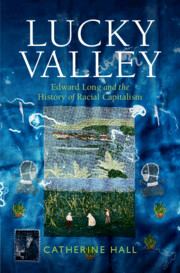Book contents
- Reviews
- Lucky Valley
- Critical Perspectives on Empire
- Lucky Valley
- Copyright page
- Dedication
- Contents
- Colour Plates
- Figures
- Maps
- Acknowledgements
- A Note on Language
- Prologue
- Maps and Family Tree
- Introduction
- Part I Growing up English
- Part II The Lineaments of Racial Capitalism
- 3 The Plantation
- 4 The Merchant House
- 5 Reproducing Capital: the Long Family
- Part III Making a Slave Society
- Epilogue
- Bibliography
- Index
- Plate Section (PDF Only)
3 - The Plantation
from Part II - The Lineaments of Racial Capitalism
Published online by Cambridge University Press: 11 January 2024
- Reviews
- Lucky Valley
- Critical Perspectives on Empire
- Lucky Valley
- Copyright page
- Dedication
- Contents
- Colour Plates
- Figures
- Maps
- Acknowledgements
- A Note on Language
- Prologue
- Maps and Family Tree
- Introduction
- Part I Growing up English
- Part II The Lineaments of Racial Capitalism
- 3 The Plantation
- 4 The Merchant House
- 5 Reproducing Capital: the Long Family
- Part III Making a Slave Society
- Epilogue
- Bibliography
- Index
- Plate Section (PDF Only)
Summary
Long arrived in Jamaica in 1758 hoping to make money and to be able to return to England soon. The plantation would be the source of his wealth, and a settlement with his older brother Robert secured him in the ownership of Lucky Valley. Having speedily made a propitious marriage into the white elite, he devoted himself for the next eleven years to every aspect of the management of a sugar plantation, all of which he subsequently described in his History. He represents the planter’s life as one of constant work and anxiety, yet ‘smoothed by the allurements of profit’. He saw himself as the head of the enterprise, responsible at every level, and disavowed the skills of the enslaved. He acquired new enslaved labour, organized the plantation on the basis of gendered and racialized practices, bought new land and built new works, greatly increasing the production of sugar and rum. Foreseeing the likelihood of an end to the slave trade, he worried about the failure of enslaved women to reproduce themselves, which he blamed on them, thus threatening future prosperity. He proposed new practices to improve what was conceptualized as ‘breeding’.
Keywords
- Type
- Chapter
- Information
- Lucky ValleyEdward Long and the History of Racial Capitalism, pp. 87 - 155Publisher: Cambridge University PressPrint publication year: 2024

